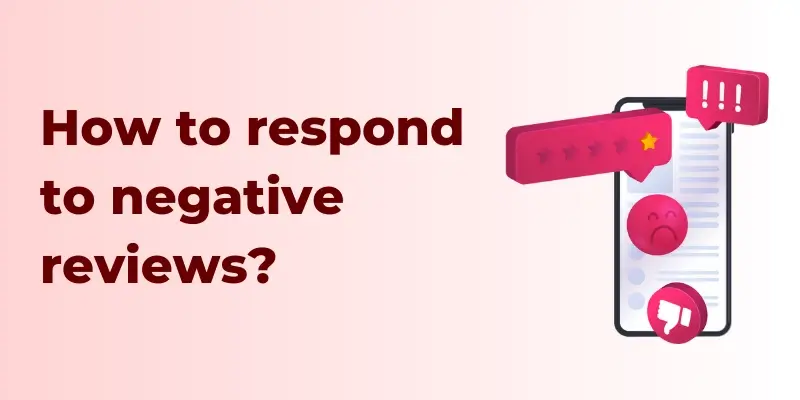
Negative patient reviews not only impact your business but get have a strong emotional impact as well. But it’s not the end of the world. In fact, negative reviews show that your practice is legit, as 68% of people trust online reviews more if they see a mix of good and bad ratings. And 92% of people suspected the reviews to be fake when they didn’t see any bad reviews.
Reviews matter, but how you handle them can make all the difference. It’s not just about managing your online reputation. It’s about learning, growing, and creating a healthcare experience that exceeds patient expectations.
Every bit of feedback, whether positive or negative, is a golden opportunity to improve and refine your services.
So, let’s explore 8 practical strategies for addressing and responding to negative reviews. We will also discuss why patients sometimes leave less-than-stellar reviews and how you can flip them in your favor.
Let’s get started.
Table of Contents- Why Do Negative Patient Reviews Happen?
- 8 Best Practices to Respond to Negative Patient Reviews
- Frequently Asked Questions about Negative Patient Reviews
Why Do Negative Patient Reviews Happen?
Negative patient reviews are inevitable. They can happen for so many reasons. But understanding them is the first step to addressing them. Sometimes, it’s a mismatch of expectations, genuine oversights, or errors made during patient care.
Other times, long wait times, lack of communication, or perceived rudeness from the medical staff can result in a negative review. Each patient’s perspective is unique. What may seem not so important to one person can significantly concern another.
Whatever the reason, you must approach each review with an open mind and a willingness to learn and improve. This will help you address underlying issues, improve patient satisfaction, and encourage a more positive healthcare environment.
8 Best Practices to Respond to Negative Patient Reviews
You just listed your practice online. Your goal? To get more positive patient reviews and boost your online reputation and visibility. So, what’s the best way to cushion the impact of a negative one? The solution is simpler than you think. All you have to do is RESPOND!
Here are the eight best tips for responding to negative patient reviews:
1. Respond Promptly
The first thing you must do when you get a negative review is to respond promptly. A swift response shows you value patient feedback and are committed to resolving issues. Address the concerns raised in the feedback, and apologize for any inconvenience.
Tell the patient that their concerns are being taken seriously. Your quick action can help de-escalate the situation and show your dedication to patient satisfaction.
The following negative review response sample is the best example of it.
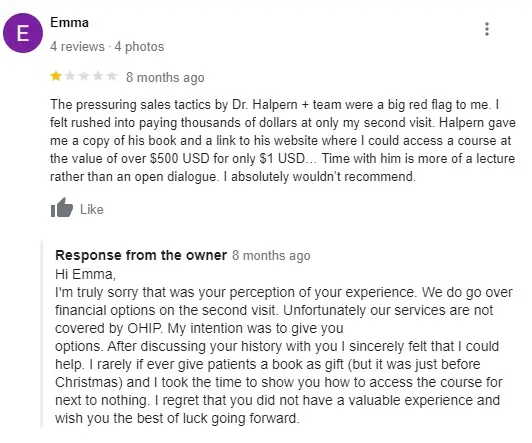
2. Acknowledge the Reviewer
Admit the patient’s feelings and experiences without placing blame, being defensive, or making excuses.
A simple acknowledgment indicates kindness and understanding. It makes the patient feel heard and valued. It’s the first step in rebuilding trust and fixing the patient-provider relationship.
See the review response example below. Even though the patient isn’t in their database, the business acknowledges the reviewer and asks him to contact the office directly for a solution.
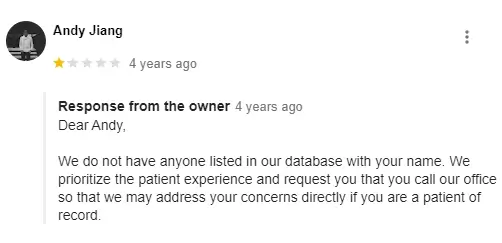
3. Avoid Being Defensive
Stay calm and maintain a professional tone. Avoid getting defensive or argumentative, even if the review seems unfair or wrong.
When you respond with compassion and professionalism, you can maintain a positive image and prevent the situation from escalating. Remember, the goal is resolution, not conflict.
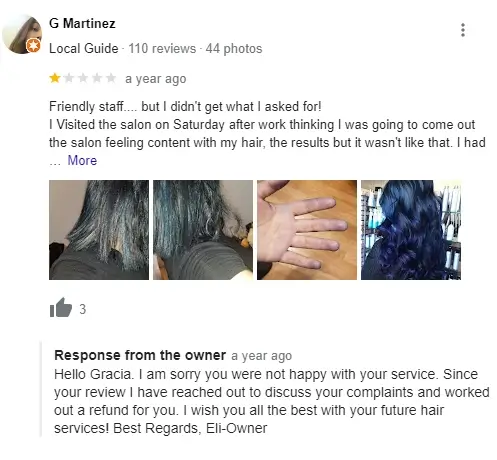
4. Say Thank You
It might seem unfair to thank someone for criticizing you, but it is essential to say thanks for their honesty. Constructive criticism is a tool for improvement. It allows you to improve your services and enhance the patient experience.
By saying thank you, you tell them you value their feedback and are committed to addressing their concerns. This will promote a sense of trust and honesty between you and your patients.
The following review response is the perfect example of showing gratitude while accepting constructive criticism and offering a quick solution.
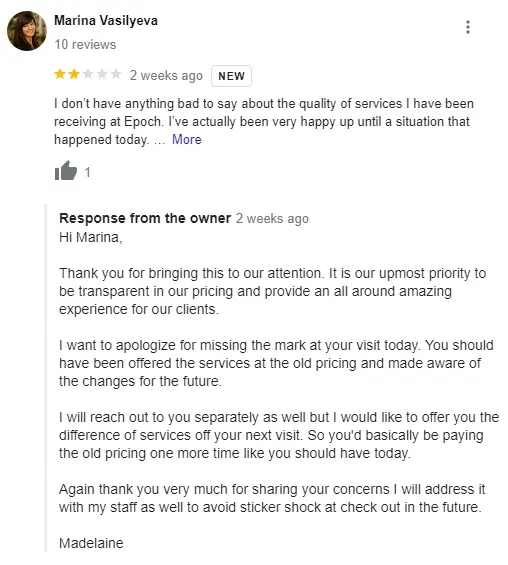
5. Avoid Cookie-Cutter Responses
Responding with a one-size-fits-all response can come off as hypocritical and dismissive. People can easily sense when a response lacks genuineness and is simply a scripted expression of empathy.
Instead, personalize your responses by addressing the reviewer with their name and mentioning the specific concerns raised by the patient. This approach will make you look like you genuinely care about your patients’ experiences.
6. Take it Offline
Engaging in a heated dialogue online can escalate the situation and damage your practice’s reputation. Instead, invite the patient to discuss their concerns privately through direct messaging or contacting your office directly.
This way, you will save yourself from public confrontations and have a more in-depth discussion with the patient. This will also allow you to respect privacy and enable a more nuanced understanding of the issues raised.
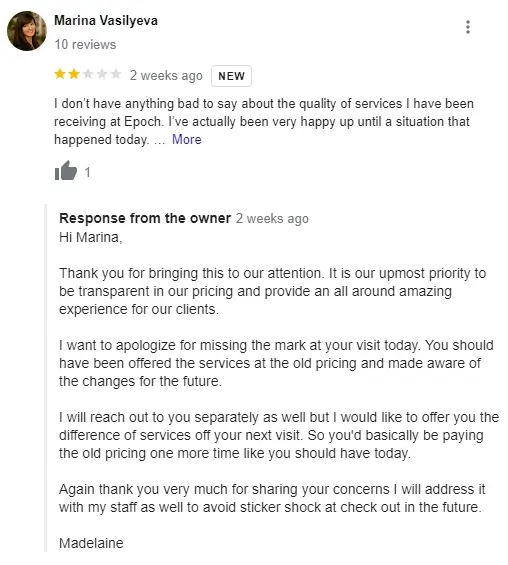
7. Develop Long-Term Strategies for Prevention
Develop and execute strategies to prevent similar issues in the future. Here are some strategies that you can adapt and expand upon:
Staff Training
Train your medical staff on patient communications and services. Invest in comprehensive training programs covering all aspects of your practice operations. This includes conflict resolution, empathy training, and cultural competency. Regularly revise these training materials to reflect best practices and new insights.
Improving Appointment Scheduling and Wait Times
Implement patient self-scheduling to streamline your appointment system. DemandHub’s text-based online scheduling solution allows you to offer an online booking system directly on your website. You can also send automatic appointment reminders to reduce no-shows in half.
Many appointment booking systems also offer real-time updates on wait times. You can optimize staff schedules by analyzing peak times and patient flow to reduce wait times.
Refine Treatment Plans
Offer personalized treatment plans to your patients. You can do this by adopting more refined diagnostic tools, including patient history comprehensively into treatment planning, or using tools and software to customize plans to unique patient needs. Refining your treatment plans can significantly enhance patient satisfaction and outcomes.
Build Strong Communication Channels
Make sure you’ve multiple communication channels between your practice and your patients. This extends beyond usual in-person or phone communications and involves digital communication platforms like web chat services, social media, and email newsletters. Transparent and consistent patient communication can prevent many issues that result in negative feedback.
The following review response shows that the practice adopted online patient portal software and is focused on training its staff.
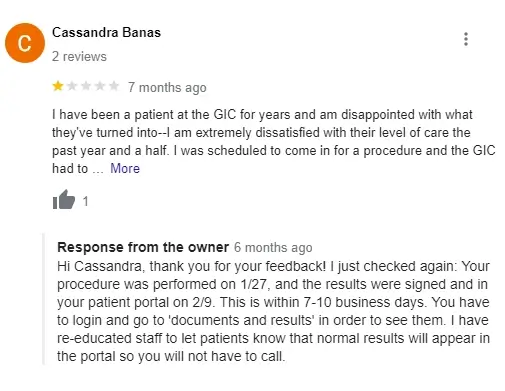
8. Implement Feedback Loops to Enhance Patient Care
Use patient feedback to improve patient care and your services. Identify areas for improvement and work on enhancing the overall patient experience.
Implement feedback loops and create a system for gathering and analyzing feedback regularly. Don’t limit this to just passive data collection. You must actively inform changes in operations, training, and policy. With DemandHub’s review management, you can monitor and respond to reviews as they come in, showing your customers you care about what they say.
Feedback loops must involve both the patients and staff to pinpoint internal challenges and improvement opportunities.
Proactive review management can help identify and address issues before they become negative reviews. It also shows your dedication to continuous improvement and patient-centered care.
Frequently Asked Questions about Negative Patient Reviews
Why are negative patient reviews vital for healthcare providers?
Negative patient reviews are important for healthcare providers as they provide insights into areas for improvement in their service. They show the patient’s perspective and experience, highlighting flaws in patient care, communication, or service.
Addressing these flaws and concerns can enhance patient satisfaction, improve reputation, and improve the quality of care.
How can a healthcare provider effectively respond to negative feedback?
Healthcare providers can effectively respond to negative feedback by acknowledging the concerns raised, expressing empathy, and avoiding confrontation. Responding promptly and professionally is essential, offering to discuss the matter privately to understand the patient’s perspective better and find a resolution.
Can online negative reviews legally be removed?
As a business owner, removing online negative reviews is hard. Legally, reviews can generally only be removed if they violate the platform’s guidelines, including hate speech, harassment, or false information.
Practitioners can request the removal of negative reviews. However, legitimate negative feedback is typically protected as free speech. The best approach is to respond professionally and address the concerns raised.
How often should healthcare providers monitor online feedback?
Healthcare providers must regularly monitor online feedback to stay informed about patients’ experiences and perceptions. Ideally, providers should check for new reviews and feedback daily or at least several times a week.
Regular monitoring allows timely responses to negative feedback and enables providers to promptly address any issues, maintaining a positive online presence and reputation.
What role does staff training play in preventing negative reviews?
Training your staff is essential for preventing negative patient reviews. Comprehensive training programs on patient communication, conflict resolution, empathy training, and cultural competency can create positive patient experiences, reducing complaints. When staff are supportive and address concerns nicely, it makes patients happy and reduces negative reviews.
How do you deal with negative feedback from patients?
To deal with negative feedback from patients, listen, understand, and address their concerns. Moreover, quickly respond to them, stay positive, and avoid being defensive. Most importantly, make the necessary improvements as highlighted in the negative review. This can be your opportunity to turn negative feedback into positive feedback.




